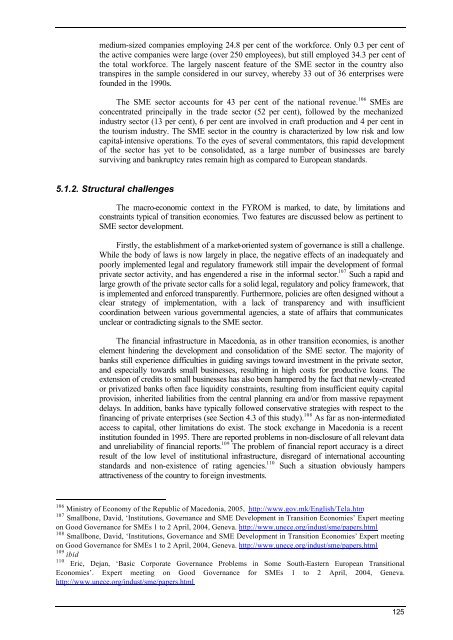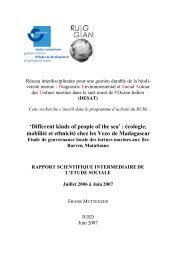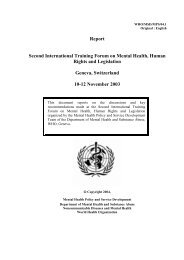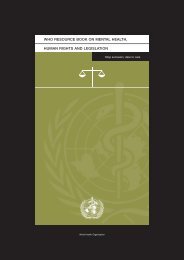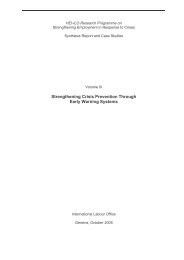5. Supporting the SMEs sector in the FYROM:Generic problematics and contextualizedpriority areasEconomic literature and international development agendas have unanimouslyrecognized the development of the SME sector as a condition for sustainable economicdevelopment, and a ‘backbone and driving force for a sustainable economy’, 103 in thedeveloped as well as in the developing world. Private sector development, and particularlythe strengthening of the SME sector, now appears prominently in international and nationaldevelopment strategies as a means to: promote full employment; improve access to incomeearning opportunities; increase economic participation of disadvantaged and marginalizedgroups; balance regional and local development; provide suitable goods and services tolocal markets; improve job quality, working conditions and access to social protection. 104The analysis below builds on an action-oriented interpretation of the field research todraw broad conclusions as far as the key constraints to be addressed for the development ofthe sector. 105 Main directions of an SME policy are proposed, building on the considerableexperience acquired internationally for an upstream effort at consolidating and developingthe sector. Such a discussion is relevant to the promotion of employment-intensive andsustainable growth for any country in the developped, transition or developing worlds. Inthe FYROM, the relevance of such discussion is compounded by the double context oftransition to the market economy (with the development of the private sector and tacklingof the social impacts of the transition) and the continuing inter-community instability.Following an overview of the SME sector in the FYROM, policy recommendationsare proposed on the general policy and regulatory framework, the access to credit, locallevelinitiatives and the issue of the dissemination of entrepreneurial skills and culture.5.1. The development of the SME sector in the FYROMin the context of the transition to the marketeconomy5.1.1. A flourishing private sectorThe privatization process in the Republic of Macedonia started in the early 1990swith the Law on Social Capital (June 1993), under which 450 (mostly large)establishments underwent owner-restructuring. In parallel to this voluntarist approach, thetransition has been marked by the development of private enterprise initiatives, with adramatic development of the SME sector.As a result, in 2001 the number of active companies in Macedonia was 34,716,employing 292,526 people. 98.3 per cent of these companies were small companies (10 to49 employees), employing 40.8 per cent of the total workforce, and 1.4 per cent were103 ‘Promo ting Small and Medium-Sized Enterprises. <strong>Final</strong> Declaration.’ OSCE Parliamentary Assembly, May2003. www.unece.org/indust/sme/bern.pdf104 Guide to ILO Recommendation No. 189, Job Creation in Small and Medium-Sized Enterprises, ILO, Geneva,pp. 4 to 5.105 This analysis, conducted in 2004/2005 builds here on a profile of the SME sector as emerging from the surveyconducted in 2001. This limitation, linked to the history of this particular study, was mitigated by a recent deskresearch that allowed to focus on the pertinent and up-to-date challenges of the sector in 2005.124
medium-sized companies employing 24.8 per cent of the workforce. Only 0.3 per cent ofthe active companies were large (over 250 employees), but still employed 34.3 per cent ofthe total workforce. The largely nascent feature of the SME sector in the country alsotranspires in the sample considered in our survey, whereby 33 out of 36 enterprises werefounded in the 1990s.The SME sector accounts for 43 per cent of the national revenue. 106 SMEs areconcentrated principally in the trade sector (52 per cent), followed by the mechanizedindustry sector (13 per cent), 6 per cent are involved in craft production and 4 per cent inthe tourism industry. The SME sector in the country is characterized by low risk and lowcapital-intensive operations. To the eyes of several commentators, this rapid developmentof the sector has yet to be consolidated, as a large number of businesses are barelysurviving and bankruptcy rates remain high as compared to European standards.5.1.2. Structural challengesThe macro-economic context in the FYROM is marked, to date, by limitations andconstraints typical of transition economies. Two features are discussed below as pertinent toSME sector development.Firstly, the establishment of a market-oriented system of governance is still a challenge.While the body of laws is now largely in place, the negative effects of an inadequately andpoorly implemented legal and regulatory framework still impair the development of formalprivate sector activity, and has engendered a rise in the informal sector. 107 Such a rapid andlarge growth of the private sector calls for a solid legal, regulatory and policy framework, thatis implemented and enforced transparently. Furthermore, policies are often designed without aclear strategy of implementation, with a lack of transparency and with insufficientcoordination between various governmental agencies, a state of affairs that communicatesunclear or contradicting signals to the SME sector.The financial infrastructure in Macedonia, as in other transition economies, is anotherelement hindering the development and consolidation of the SME sector. The majority ofbanks still experience difficulties in guiding savings toward investment in the private sector,and especially towards small businesses, resulting in high costs for productive loans. Theextension of credits to small businesses has also been hampered by the fact that newly-createdor privatized banks often face liquidity constraints, resulting from insufficient equity capitalprovision, inherited liabilities from the central planning era and/or from massive repaymentdelays. In addition, banks have typically followed conservative strategies with respect to thefinancing of private enterprises (see Section 4.3 of this study). 108 As far as non-intermediatedaccess to capital, other limitations do exist. The stock exchange in Macedonia is a recentinstitution founded in 1995. There are reported problems in non-disclosure of all relevant dataand unreliability of financial reports. 109 The problem of financial report accuracy is a directresult of the low level of institutional infrastructure, disregard of international accountingstandards and non-existence of rating agencies. 110 Such a situation obviously hampersattractiveness of the country to foreign investments.106 Ministry of Economy of the Republic of Macedonia, 2005, http://www.gov.mk/English/Tela.htm107 Smallbone, David, ‘Institutions, Governance and SME Development in Transition Economies’ Expert meetingon Good Governance for SMEs 1 to 2 April, 2004, Geneva. http://www.unece.org/indust/sme/papers.html108 Smallbone, David, ‘Institutions, Governance and SME Development in Transition Economies’ Expert meetingon Good Governance for SMEs 1 to 2 April, 2004, Geneva. http://www.unece.org/indust/sme/papers.html109 ibid110Eric, Dejan, ‘Basic Corporate Governance Problems in Some South-Eastern European TransitionalEconomies’. Expert meeting on Good Governance for SMEs 1 to 2 April, 2004, Geneva.http://www.unece.org/indust/sme/papers.html125
- Page 1 and 2:
HEI-ILO Research Programme onStreng
- Page 3:
PrefaceThis three-volume series res
- Page 7 and 8:
Table of contentsPreface...........
- Page 9:
The Private Sector and Social Partn
- Page 13:
Executive summaryPrivate enterprise
- Page 16 and 17:
IGOs, NGOs—tend to exclude, or at
- Page 18 and 19:
• The World Bank has created a kn
- Page 20 and 21:
2. Private enterprises in conflict-
- Page 22 and 23:
Figure 1: The Private Sector Employ
- Page 24 and 25:
2.3. Case study: Promoting multi-et
- Page 26 and 27:
downstream, i.e. refining and distr
- Page 28 and 29:
Box 1: How does Somalia’s private
- Page 30 and 31:
Sectoral aspectsthere will be added
- Page 32 and 33:
inequities in pricing. “Of the 16
- Page 34 and 35:
into the armies are thereby also at
- Page 36 and 37:
3. Private enterprises and social p
- Page 38 and 39:
Two natural disasters which have be
- Page 40 and 41:
Box 4: Cooperatives in crisis respo
- Page 42 and 43:
partners, the tripartite cooperatio
- Page 44:
36forces and that are able to perfo
- Page 48:
AcknowledgmentsThe authors of this
- Page 51 and 52:
6.2. Delimiters of women’s econom
- Page 54 and 55:
Executive summaryDespite the rich n
- Page 56 and 57:
1. IntroductionSince 1979, under th
- Page 58 and 59:
2. Country profileThe Republic of I
- Page 60 and 61:
• activities related to reconstru
- Page 62 and 63:
for university education concerning
- Page 64 and 65:
2.4. Economic environment assessmen
- Page 66 and 67:
Unemployment (15 years of age and a
- Page 68 and 69:
2.5. PerspectivesDespite devastatio
- Page 70 and 71:
3. The rationale of SME sector deve
- Page 72 and 73:
4. Iraq's SME sector: A profile4.1.
- Page 74 and 75:
The Private sector employment pyram
- Page 76 and 77:
Table 8: Estimates of total formal
- Page 78 and 79:
Feasibility study: almost all respo
- Page 80 and 81:
Table 9: Percentage of female entre
- Page 82 and 83: Factors for public sector preferenc
- Page 84 and 85: The recessionary indication of busi
- Page 86 and 87: Special investment legislation and
- Page 88 and 89: 8. Small entrepreneurs in Iraq: Sto
- Page 90 and 91: a reasonable income and independenc
- Page 92 and 93: 9. RecommendationsSME-development s
- Page 94 and 95: Longer-term SME developmentBesides
- Page 96 and 97: • literature and artistic service
- Page 98 and 99: 2. List of interviews with governme
- Page 100 and 101: 11. Why did you decide establishing
- Page 102 and 103: 33. What are the cost components of
- Page 104 and 105: 59. Are you working on a project, o
- Page 106: Promoting multi-ethnic stakeholder
- Page 109 and 110: 101
- Page 111 and 112: 103
- Page 113 and 114: 105
- Page 115 and 116: 107
- Page 117 and 118: 109
- Page 119 and 120: Research methodologyThe research te
- Page 121 and 122: possibility of conflict. In 1992, a
- Page 123 and 124: 2.2.2. PovertyAfter the break-up of
- Page 125 and 126: of almost 10 per cent of GDP, yet i
- Page 127 and 128: Source of initial financing: privat
- Page 129 and 130: ‘It is important to point out tha
- Page 131: 4.2. The economic resilience of int
- Page 135 and 136: 5.2. Addressing constraints for SME
- Page 137 and 138: 5.4. Support to local initiativesSM
- Page 139 and 140: ConclusionConsidering the actual an
- Page 141 and 142: Scott, Norman: Macedonia: A Brief E
- Page 143 and 144: Official gross reserves 4 290 450 7
- Page 145 and 146: 4. Survey questionnaire1. Name of t
- Page 147 and 148: 139
- Page 149 and 150: 141
- Page 151 and 152: 143
- Page 153 and 154: 2. Le contexte2.1. Le paradoxe ango
- Page 155 and 156: Composition et description des Futu
- Page 157 and 158: Les généraux angolais sont prése
- Page 159 and 160: Les syndicats officielsL’Union na
- Page 161 and 162: Une étude réalisée en 2003 pour
- Page 163 and 164: 3.3. Sortir du cercle vicieux : vie
- Page 165 and 166: Annexes1. Morceaux choisis : le «
- Page 167 and 168: 159
- Page 169 and 170: L’implication des partenaires soc
- Page 171 and 172: Table des matièresTable des matiè
- Page 173 and 174: RemerciementsQu’il me soit permis
- Page 175 and 176: Liste des acronymesAFASPAALEANEAANS
- Page 177 and 178: GlossaireAide d’urgence :Aléa :A
- Page 179 and 180: Résumé exécutifAu cours des dix
- Page 181 and 182: 1. IntroductionLe département de R
- Page 183 and 184:
Limites de l’étudeAvant de proc
- Page 185 and 186:
évalué à plus de deux milliards
- Page 187 and 188:
2.2.2. Aspects démographiquesLes p
- Page 189 and 190:
2.3.3. EducationDès l’indépenda
- Page 191 and 192:
création de fonds de stabilisation
- Page 193 and 194:
3. Analyse des formes de réponse :
- Page 195 and 196:
• le secteur de l’Eau sera dest
- Page 197 and 198:
• la révision de la législation
- Page 199 and 200:
de main-d’œuvre, encourageant la
- Page 201 and 202:
leur fournissait les équipements e
- Page 203 and 204:
matérielle sous des formes diverse
- Page 205 and 206:
centre de l’attention des partena
- Page 207 and 208:
• le rôle dévolu à la commissi
- Page 209 and 210:
Renforcer le rôle de solidarité d
- Page 211 and 212:
ConclusionLa dimension de la tache
- Page 213 and 214:
Equipe Multidisciplinaire pour l’
- Page 215 and 216:
2. Séries statistiquesTable 8 : Ev
- Page 217 and 218:
Table 11 : Répartition de la popul
- Page 219 and 220:
Table 2 : Liste détaillée des com
- Page 221 and 222:
Table 4 : Dispositif d’interventi
- Page 223 and 224:
Organisation de l’unité syndical
- Page 225 and 226:
- Centre technique de construction.
- Page 227:
219


